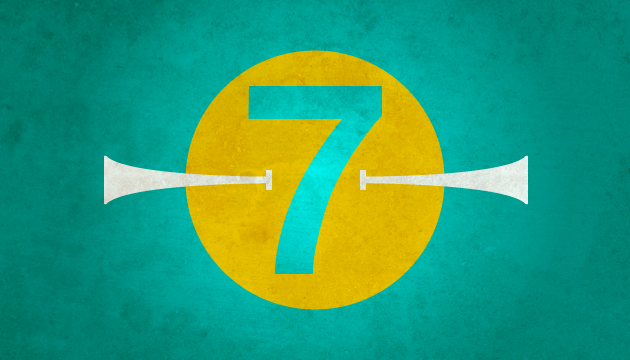Now on the seventh day they rose up early as dawn arose and they marched around the city. This was according to the pattern: seven times on that day they marched around the city, only seven times that day. Then on the seventh time the priests blew the trumpets. So Joshua said to the people, “Shout! For the LORD has given the city to you. And the city shall be devoted (Heb. ban) along with all that is in it. Only Rahab the whore shall live, and all who are with her in the house because she hid the messengers whom we sent.” (Josh 6:15-17)
The seven trumpets certainly sounded terror to a people already trembling in fear. Rahab had reported to the spies that the whole city was in fear because of the judgment God had brought on the Egyptians and the two kings in the Transjordan (Josh 2:9-11). Indeed the terror of Israel had fallen on the people. It seems reasonable to infer that the king and all his subjects in Jericho watched the march of God’s people with dismay and terror, knowing that the mighty God of Israel was arrayed against them. Rahab, too, must have been subject to fear since she had her allegiance with God’s people but dwelt in the doomed city. The seven blasts of the seven trumpets announced the imminence of death to the subjects of Jericho. But for Rahab and her house, the trumpet blasts announced their coming deliverance. To Rahab, they were trumpets of promise, that her covenant of peace would be respected to her salvation and that of her household. How differently were the trumpet blasts heard in Jericho that day!
We have noted elsewhere the elaborate analogy of the battle of Jericho to the great battle depicted in Revelation. The climactic eschatological warfare is patterned after Joshua’s victory over Jericho. If that is the case, then we should expect that the message of the Apocalypse should speak the same terror and comfort with respect to the sounding of Revelation’s seven trumpets. Those trumpets likewise bring fear to the earth dwellers. The trumpets announce cosmic judgments against the vegetation of the earth, the seas, the waters, the heavens; they bring swarms of locusts, great armies, and great hail. The seven trumpets appear to rehearse all the plagues of Egypt and the judgment of Sodom. They create terror among the earth dwellers (Rev 9:6). But it would also seem that the trumpets of cosmic judgment, as terrifying as they are, should speak comfort to the hearts of God’s remnant in the earth in those days, just as they had for Rahab, for they announce that while God has come to judge the unrepentant (Rev 9:20-21), He has also come to deliver His own covenant people from all harm. He has promised them safety in the great judgments to come upon the world.
Jesus expressed similar comfort to His followers who suffered through the judgment against Jerusalem in AD 70, a cataclysmic judgment that Jesus’ disciples rightly understood to foreshadow the end of the age (Matt 24:3). The true Joshua said, “And you will hear of wars and rumors of wars. See that you are not troubled; for all these things must come to pass, but the end is not yet.” (Matt 24:6) Rahab’s comfort was her covenant of peace. Her surety was that she would be delivered because of her covenant. Rahab’s comfort is ours too, all of us who like her have partaken of Jesus’ gracious covenant promises. When the judgments on this present age intensify, we can comfort our hearts that our redemption draws close at hand! Our better Joshua is on the march! And He is coming to rescue us!
